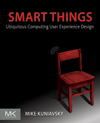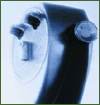Jupiter just published a report called "Home Automation: The Viability of Remote Household Management". I haven't read it (I don't have a Jupiter account--if you do, and have access to this report and wouldn't mind letting me look at it, drop me a note), but the summary is pretty clear: "Consumer interest in home automation is stagnant. Slow vendor response to a growing interest in the networked home has prevented the uptake of home automation solutions."
I'm not a big home automation fan, as far as its current incarnation as an extension of audiphile technological obsessiveness is concerned, but I do think that as computers fragment into everyday objects, what we call "home automation" will merge with ubiquitous computing. If the analysts are thinking about this market as stagnant because vendor response is slow, then that's potentially a trigger for the vendor response to be quicker. Technology companies have been puttering around this field ever since Gateway tried to follow the "convergence" star and put out TV-computer hybrids in the mid-90s that weren't particularly good at being either, but there seems to be a renewed interest in the home. Dell is successfully selling TVs. Microsoft's Xbox 360, with it ability to do other things (what other things isn't clear yet) beside play games, is an interesting way to weasel into hardware without having the overhead of competing against Dell (granted, they have to compete against Sony, but only on one front). Intel has a Digital Home division. There are rumors of Apple buying TiVo.
The meme is out there, it's been out for a while, but maybe it's approaching some kind of inflection point. Most of these companies are still thinking in terms of standalone boxes, but someone's going to find the writing on the wall (i.e., the money in people's pockets) pretty soon, and then it's going to break open for consumers like WiFi did, which will in turn get the other companies into the act.




Yup. I concur. The question is when the two worlds will meet. This is an absolutely classic "crossing the chasm" (http://en.wikipedia.org/wiki/Crossing_the_Chasm) situation where the crossing has to happen by offering people affordable solutions that actually relate to everyday life in a genuine and deep way, rather than to some automated tweak to make opening and closing the curtains more efficient.
The Hef's place version of the super bachelor pad home automation - where one controls their gas fired fireplace from the road is certainly lame. The notion of utilizing increasingly available video display real estate (LCDs, Plasmas, etc.)for providing something OTHER than Jerry Springer is certainly NOT lame. Either of these applications are extensions of an increasing trend towards home networks being 'on' the grid. Providing access and control to services in your house is almost a certainty at this point. It's already happened throughout much of industrialized Pac Rim.
Another way to look at this is that your house IS a platform and the services you operate in yourhouse - storage, printing, freezing, cooling, lighting, security - can, should and will be available from anywhere.
It's up to the design community to begin standardizing interfaces for this stuff so we don't end up with the typical multi-vendor mish-mash that we see in at the beginning of all new things. The fact that the notion of home automation has been around so long is just proof positive that it's a concept waiting for the technology to catch up rather than an actual development.
The first wave of any new idea is a shoehorning of it onto an old idea. MP3 CD players, the media PC and the PC fridge are such chimera objects that bridge two fully-formed ideas, but one of them hasn't formed yet, so we don't know what the final version will look like.
I saw an article last week about a fridge-with-a-TV; I was sure it had been done, and done, and done, but this was certainly spun like it was new.
But maybe the Internet-on-a-fridge meme has died? I surely hope so.